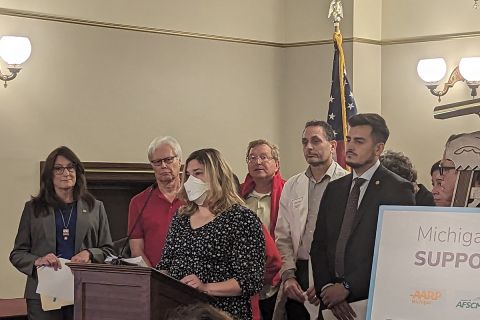Michigan Dems eye board to set prescription prices. Some fear chilling effect
Members of the board would be nonpartisan health care experts who don’t have a personal or financial stake in the pharmaceutical industry, said Sen. Darrin Camilleri, a Trenton Democrat and a lead sponsor on the package.
Related:
“This has to be a consumer driven, health care driven and advocacy driven process,” Camilleri said.
The legislation also would create a separate nonvoting council representing drug manufacturers and others in the industry to serve in an advisory role.
Between July 2021 and July 2022, the prices of 1,216 drugs increased above the rate of inflation at an average of 31.6 percent, according to the federal government. In January, USA Today reported pharmaceutical companies raised prices on nearly 1,000 drugs.
The federal Inflation Reduction Act set some parameters around price increases, including allowing Medicare to negotiate the prices of some drugs that don’t have a generic or similar alternative.
The Centers for Medicare and Medicaid Services recently began those negotiations for 10 drugs, many of which retail between $200 to $500 per month.
A January 2022 survey of Michigan adults by Ann Arbor nonprofit researcher Altarum found 51 percent of respondents delaying or skipping healthcare due to cost, 27 percent of whom reported rationing or skipping doses of prescription medication.
“We have segments of our population — large segments of our population — who get left behind, and as a result, they have worse health outcomes and they have a shorter lifespan, reduced longevity, ” former Ingham County Health Officer Linda Vail said.
Since 2019, seven states — Maryland, Colorado, Maine, New Hampshire, Ohio, Oregon and Washington — have created a prescription drug affordability board or similar council, according to the National Conference of State Legislatures.
Those state boards have been slow to get started. The first, created by Maryland legislators in 2019, in July approved a framework for evaluating which medications could be eligible for the price reductions after months of delays over state funding, rule rewrites and public comments, according to nonprofit newsroom Maryland Matters.
Stephen Rapundalo, president and CEO of MichBio, an Ann Arbor-based group representing the biosciences industry, predicted Michigan and other states exploring prescription drug boards could face similar fates, noting their members are concerned the bills could hamper pharmaceutical research and innovation efforts in Michigan without doing much to lower consumer drug costs.
During a recent address, Whitmer suggested Michigan should be the next state to test the concept, proposing creation of an independent, nonpartisan board that would “use data and evidence-based research to tackle the cost of prescription drugs.”
“We need to hold bad actors across the supply chain accountable for skyrocketing prices while also encouraging R&D for new treatments and cures — made right here in Michigan,” Whitmer said in the speech.
The concept has support from the Michigan Association of Health Plans, AARP Michigan, the Michigan Nurses Association and Service Employees International Union of Michigan.
No Byline Policy
Editorial Guidelines
Corrections Policy
Source
